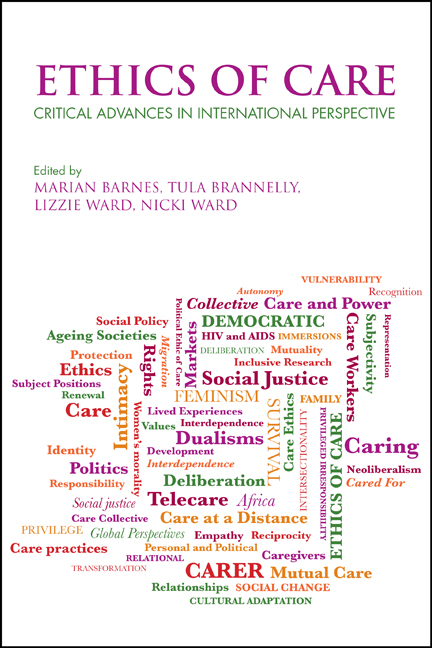Thirteen - Reciprocity and mutuality: people with learning disabilities as carers
Published online by Cambridge University Press: 08 March 2022
Summary
Introduction
In the introduction to this collection we posed the question ‘why now?’ in relation to the salience of exploring and developing the feminist ethic of care. This chapter, while focused on carers who have a learning disability, is in many ways representative of wider demographic and policy shifts that have marked the delivery of social care in Western society since the 1980s. Improved healthcare means that families are living longer and are ageing together in ways that generate new and shifting relationships of care. At the same time, policies that have sought to enhance the rights and independence of people with learning disabilities have also contributed to new patterns of care. Disability activists have argued that those with disabilities are disempowered by relationships of care (Morris, 2004; Beckett, 2007). However, the social practices of care explored here suggest a more complicated picture that is illustrative of nested relationships of care (Barnes, Chapter Three in this volume) and suggestive of the need to adopt a post-structuralist understanding of power, positioning and multiple intersectional identities (Ward, N., Chapter Five in this volume).
Debates about the way that decisions made in the public sphere can impact on private lives are also significant here. Public and social policies and political decision making, as well as our social interactions, all impact on our daily lives and in this way the boundary between the public and the private can be seen as artificial (Tronto, 1993). For people with learning disabilities, because they are deemed vulnerable and in need of care and protection, their lives are, more than most, shaped and influenced by public policy. The experiences of carers with learning disabilities explicitly demonstrate the way that private relationships of care and support are impacted on by public discourses that contribute to the construction of them as (dis)abled as well as denoting how they are supported by public policy.
The practice of care is a social one through which moral considerations are expressed (Sevenhuijsen, 1998); it is not purely an emotional or intuitive response, but one that involves the person in actively thinking through and making judgements about the best thing to do in the situation and, as such, it is an expression of moral agency.
- Type
- Chapter
- Information
- Ethics of CareCritical Advances in International Perspective, pp. 165 - 178Publisher: Bristol University PressPrint publication year: 2015



